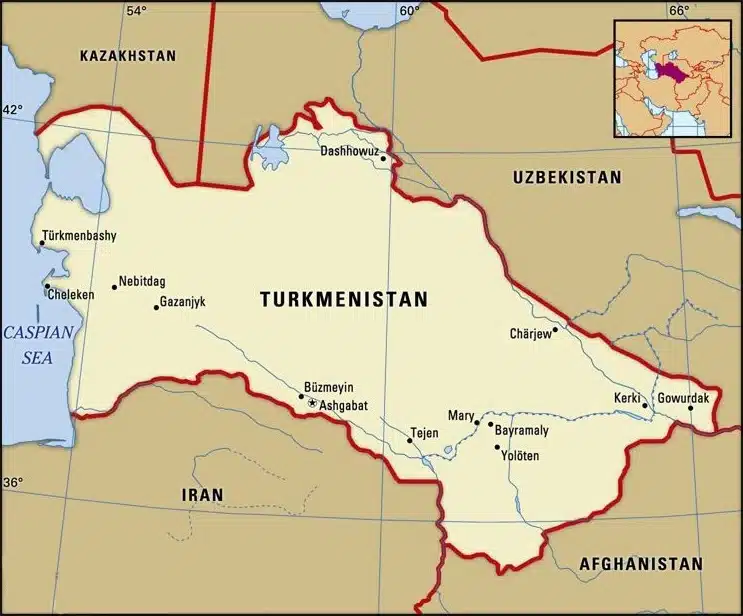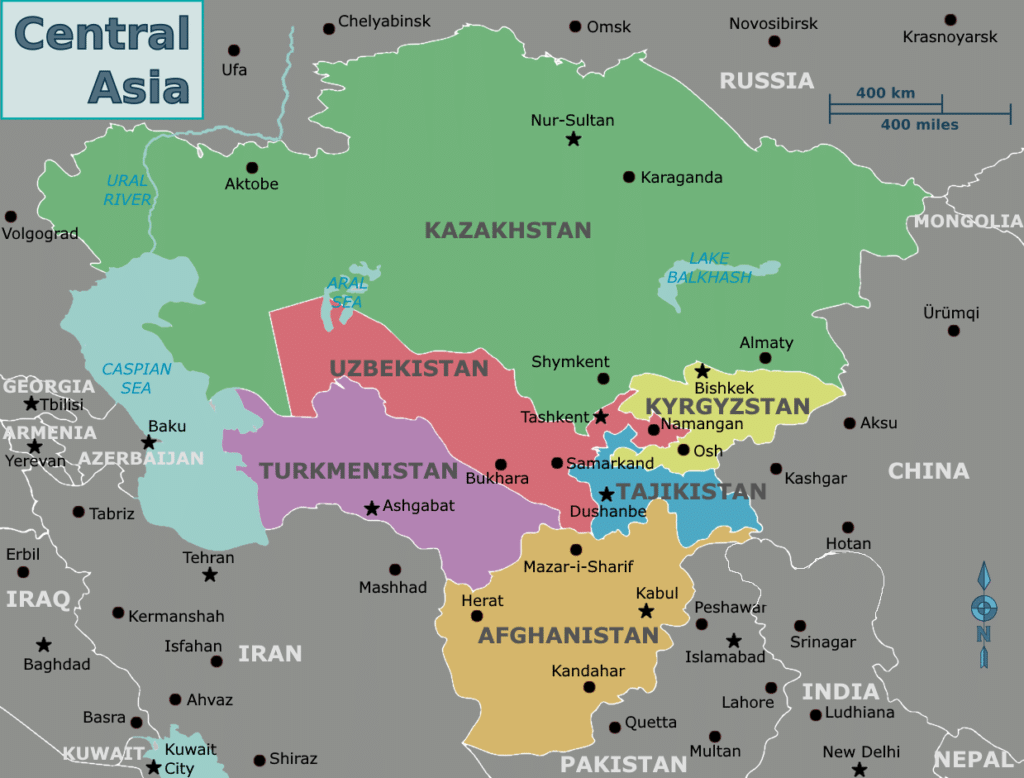- Turkmenistan was the part of former USSR which proclaimed its independence with the breakup of soviet union in 1991.
- It shares boundary with Kazakhstan and Uzbekistan with the main river Amu Darya. It is mostly covered with deserts. It has an area of 488,100 square km and stretches 650 km from north to south and 1,100 km from east to west.
- Some of the cities like Merv (one of world’s largest ancient cities in the beginning of the 13th century) and Urgench (a major centre of culture) has greatly influenced the architecture and art in whole central Asia and the world.
- Hundreds of hills and crumbling ruins all over the country testify that this country had a great and interesting path.

Areas of Cooperation
The two countries have been cooperating with each other in various areas like:
Political:
- India and Turkmenistan cooperate under the India-Central Asia Dialogue mechanism as well, last iteration of which was held in October 2020.
- Turkmenistan holds a special place for India which is evident from Turkman gate built in Delhi in 1650s. PM Nehru also visited Ashgabat in 1955. Another visit was made by former Vice-President Hamid Ansari in 2015 to mark the 20th anniversary of adoption of the status of ‘Permanent Neutrality ‘ , similar to that of Non Alignment Movement of India.
Education:
- In the Education sector, India provides ITEC (Indian Technical and Economic Cooperation) training to Turkmen nationals in India. Since the inception of the programme for Turkmenistan in 1994, over 400 Turkmen nationals have been trained in various courses.
- It also provides ICCR (Indian Council for cultural Relations) scholarships to students of Turkmenistan nationals.
- There are currently over 300 Students from Turkmenistan pursuing their higher education in various reputed universities in India. In 2010, a Hindi Chair was established by India in Azadi Institute of World languages, Ashgabat where Hindi is being taught to university students.
Culture:
- Indian Cinema and TV serials are popular with Turkmen people. Similarly, Indian music also holds a special place in the hearts of Turkmen people.
- Indian film festivals are held on regular basis in different cities in Turkmenistan. ‘India Cultural Week’ including exhibition, dance performance, film and food festival was celebrated in Ashgabat in May 2017 to mark 25th Anniversary of Diplomatic Relations between India and Turkmenistan.
- An Indian Tabla group visited Turkmenistan for participation in International Scientific Conference and festival “Ancient Cradle of Musical Art” organized by State Cultural Centre of Turkmenistan in April, 2018.
- A 14-member group “Bollywood Rockers” performed in Turkmenistan in August 2019. An 11-member Turkmen Cultural Folk Group “Galkynysh” visited India to participate in the International Folk Dance and Music Festival in December 2018.
Trade:
- The trade relations are in favour of India with a good trade surplus. Major items of import from India include electronic and electrical items, machinery and woven apparel and pharmaceuticals, frozen meat and tyres, while exports to India comprise of raw hides and inorganic chemicals like iodine.
Energy:
- TAPI gas pipeline is the keystone in energy cooperation.
Traditional Medicine and Yoga Centre:
- Central Asia’s first Yoga and Traditional Medicine Centre was inaugurated by Hon’ble PM of India in Ashgabat in July 2015.
- Yoga Teacher and Ayurveda Expert have been deputed to the centre from India and offer classes / consultations to interested people.
Air links with Turkmenistan:
- Turkmenistan Airlines operated 3 direct flights to New Delhi and 6 flights to Amritsar a week which are currently suspended due to Covid-19 pandemic.
Indian community in Turkmenistan:
- There are very few Indian nationals in Turkmenistan. Most are semi-skilled workers employed in construction sector. There are also a few engineers, professionals and technicians working in oil and gas sector. There are no Indian Associations or Indian students in Turkmenistan.
Challenges in the Relation
- There is lack of people to people contacts between the two countries. There is no significant Indian Diaspora in Turkmenistan as the local law does not permit citizenship to any foreigners.
- There has been a decline in number of Indian workers due to the completion of certain projects of foreign companies for which the Indians were working .
- There are no Indian Associations or Indian students in Turkmenistan.
- Connectivity concerns: Adverse geographic terrain and the thorny India-Pakistan border greatly impede connectivity, thereby curbing greater economic cooperation between India and the region.
- Unrealized trade potential: factors such as trade regulatory hindrances and political fragility have often created obstacles to the free flow of trade.
- Security challenges: Radicalisation, Illegal migration, and trafficking in narcotic drugs and psychotropic substances are some of the security challenges.
Future Prospects
- Turkmenistan shall open up itself and increase the Indian diaspora and people to people contacts, which shall be mutually beneficial for both the countries.
- A huge potential in trade and investment along with security and defence cooperation.
Conclusion
- Strengthening connectivity through initiatives like INSTC, and formalization of agreements pertaining to the TAPI gas pipeline are all avenues offering cooperation.
- Turkmenistan has further expressed interest in studying the possibility of joining the International Solar Alliance (ISA) and the Coalition of Disaster Resilient Infrastructure (CDRI).
- Based on values of trust and cooperation, the partnership between two nations allows opportunities to overtake others and go beyond bilateral relations.

